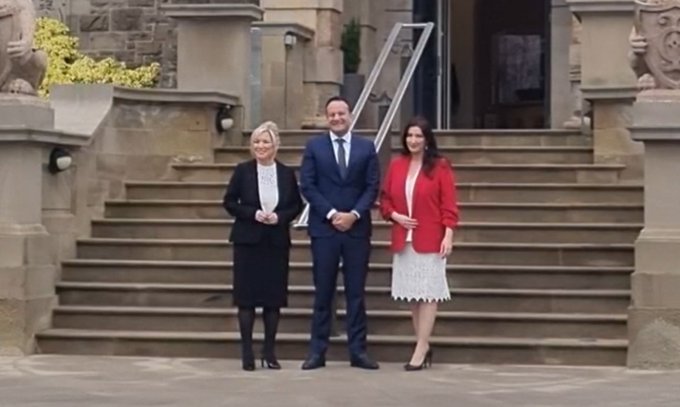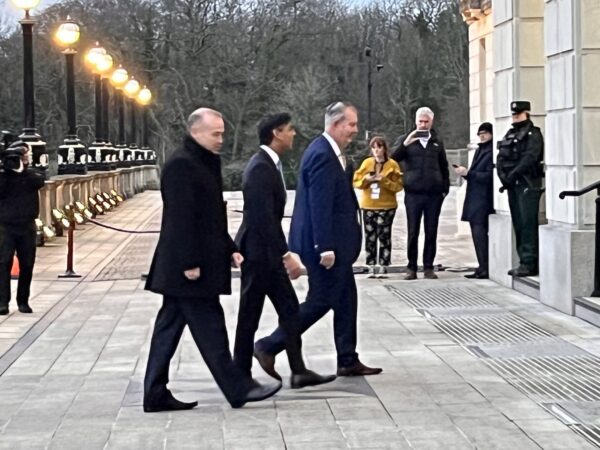 Taoiseach Leo Varadar and British Prime Minister Rishi Sunak have visited Stormont today as the new power sharing Executive meets to plan the way forward for the North of Ireland.
Taoiseach Leo Varadar and British Prime Minister Rishi Sunak have visited Stormont today as the new power sharing Executive meets to plan the way forward for the North of Ireland.
An Taoiseach arrived at Stormont Castle to be greeted by the new First Minister Michelle O’Neill and deputy first minister Emma Little-Pengelly.
A short time earlier British Prime Minister Rishi Sunak and Secretary of State Chris Heaton-Harris also met the new FM/DFM at the Castle.
The Prime Minister joined ministers round the Executive table during his Stormont visit.
He sat between Michelle O’Neill nd Emma Little-Pengelly.
Mr Sunak told executive ministers they can restore people’s faith in politics as “a force for good”.
“I absolutely believe that you will be able to do that,” he added.

British Prime Minister Rishi Sunak, Secretary of State Christ Heaton-Harris and new Speaker Edwin Poots arrive at Stormont
Despite all the symbolism surrounding the visits, a long, hard road lies ahead for the newly formed Executive after two years in the political wilderness after the DUP walked out in a row over post-Brexit trade arrangements.
The British Government promised £3.3 billion in extra funding for the North but local politicians say they need more to fix all the problems facing the Executive.
Budget pressures have mounted up and there is no shortage of challenges facing the new ministers.
There are two pressing priorities: setting a budget for the new financial year in April and settling the public sector pay disputes which led to a massive strike in January.
The North’s health service has the worst waiting lists in the UK and its staff are paid less than their NHS colleagues in Great Britain.
Top of the pile for UUP Health Minister Robin Swann will be securing pay parity for health workers and attracting more staff to help clear the backlog of patients waiting on treatment.
He is said to have a “cancer care and elective care strategy good to go”, according to his UUP party leader Doug Beattie.
He has already written to health trade union reps asking for a meeting to discuss a pay award for NHS workers.
Education is Stormont’s second biggest spending sector but teachers were among those who took part in the public sector strikes, as their pay has also fallen behind their Great Britain counterparts.
There are demands for money for new school buildings, youth services and school transport and the new Education Minister Paul Givan certainly has plenty of work on his plate.
Tags:




